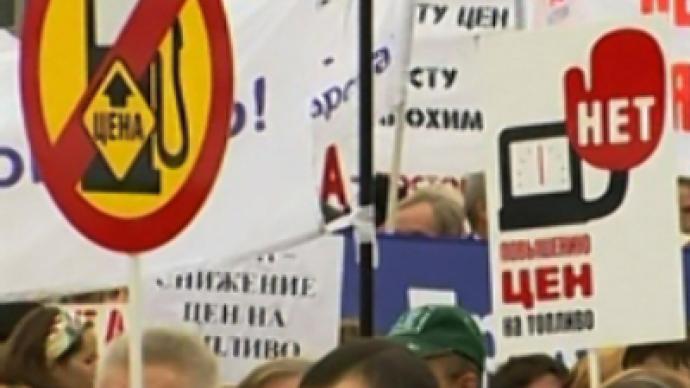Protests against rising oil prices

Demonstrations against rising fuel prices have taken place in Russia's main cities all over the country. Direct action will include picket lines outside of Russia's main oil companies and rallies on the cities' main squares. A petition will also be signed
The protests were organised by the Federation of Russian Independent Trade Unions, which blames government policy for the recent increase in the price of fuel.
The union movement fears that additional taxes and fees will lead to further rises by the end of the year. One of the protest's organisers – Viktor Mokhnachev – admits that this type has already been organised back in 2005. “Back then, we were fed promises, but no action has been taken,” he said.
According to the Russian State Statistic Service, retail petrol prices have risen by more than 20% since the beginning of 2008. Representatives of the the Federation of Russian Independent Trade Unions call this a “state of national emergency”.
Russian fuel prices are attached to the world's average which, according to representatives of the Federation of Russian Independent Trade Unions, is more logical for countries importing oil. Russia exports oil, so, with the rise of world prices, the level of national revenue increases. Raising prices on the home market is not strictly necessary, they claim. In the UAE, another major exporter of oil, petrol costs 37 cents a litre, compared to Russia's $1.03. However, the high cost of a litre of petrol is mainly due to the high level of tax – it is currently set at 60-65%.
Compared to the world average, Russian fuel prices are relatively low. Fuel prices in the UK and Norway, for example, are, on average $2 higher than in Russia. Fuel prices are expected to double in Europe in the space of a year, according to one leading consulting agency. Prices in Russia have risen by 20,5% in the first half of 2008, meaning that the pace is similar to its European neighbors. Nevertheless, the biggest concern is that fuel prices in Russia are almost equal with those in the US, with the discrepancy in the average income level being significant.
Some suggest that the petrol protests came late, since fuel prices in Russia are already falling. Despite a steady increase of 0,6-0,8% every week since the beginning of the year, fuel started going down in price in mid-august, according to government statistics. The fall in price wasn't significant (0,3% on average every week), but steady. Many experts, most notably Evgeny Arkusha – the president of the Moscow fuel association – have suggested that this slow fall in price will stretch out well into September.












